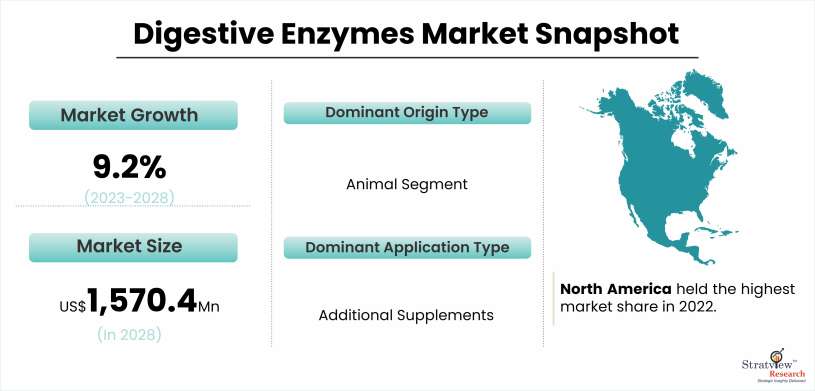In recent years, there has been a noticeable surge in the demand for digestive enzymes, with a growing number of consumers seeking natural solutions to improve digestive health and overall well-being. Digestive enzymes play a crucial role in breaking down complex food molecules into simpler ones, aiding in the absorption of nutrients and promoting a healthy gut. As people become more health-conscious and aware of the benefits of digestive enzymes, the market has experienced significant growth, accompanied by several emerging trends. This article provides a comprehensive overview of the rising demand and market trends of digestive enzymes. The digestive enzymes market is estimated to grow from USD 925.8 million in 2022 to USD 1,570.4 million by 2028 at a healthy CAGR of 9.2% during the forecast period.
Understanding Digestive Enzymes:
Digestive enzymes are proteins produced by the body to facilitate the breakdown of carbohydrates, proteins, and fats in the digestive tract. The main types of digestive enzymes include amylases (break down carbohydrates), proteases (break down proteins), and lipases (break down fats). Additionally, there are plant-based digestive enzymes derived from sources like papaya and pineapple, which have gained popularity among vegetarians and vegans.
Factors Driving the Demand for Digestive Enzymes:
Several factors contribute to the increasing demand for digestive enzymes:
Growing Health Consciousness: As people become more health-conscious, they are seeking ways to optimize their digestion and nutrient absorption. Digestive enzymes are seen as a natural and effective solution to promote better digestive health.
Rise in Digestive Disorders: The prevalence of digestive disorders such as irritable bowel syndrome (IBS), lactose intolerance, and acid reflux has led individuals to explore digestive enzyme supplements to alleviate symptoms and improve digestion.
Aging Population: With an aging population, there is a higher incidence of digestive issues. Digestive enzyme supplements have gained popularity among older adults looking to maintain their digestive health and enhance nutrient absorption.
Increased Adoption of Enzyme-Restricted Diets: Many individuals are following restrictive diets such as gluten-free or lactose-free diets, which can be lacking in certain digestive enzymes. Enzyme supplements help compensate for these deficiencies.
Market Trends:
The market for digestive enzymes is witnessing several notable trends:
Plant-Based Enzymes: Plant-based digestive enzymes, particularly those derived from papaya and pineapple, are gaining traction due to their natural origin and suitability for vegetarians and vegans. These enzymes are often seen as a more sustainable and ethical choice.
Enzyme Blends: Formulations combining multiple types of enzymes to target different types of food are becoming more prevalent. These blends offer comprehensive digestive support, catering to a wider range of consumers.
Digestive Enzymes in Food & Beverages: Manufacturers are incorporating digestive enzymes into food and beverage products, such as protein shakes and meal replacements, to enhance digestibility and nutrient absorption.
Online Retail and E-Commerce: The rising popularity of online shopping has extended to the digestive enzyme market. Consumers find it convenient to purchase supplements online, with a wider selection of products and competitive prices.
Focus on Gut Health: Digestive enzymes are now marketed not only for digestion but also for overall gut health. Brands are highlighting the role of enzymes in maintaining a balanced gut microbiome, which has been linked to various aspects of health.
Customized Enzyme Supplements: Some companies are offering personalized digestive enzyme supplements based on an individual's dietary preferences, health conditions, and specific enzyme needs, making the products more tailored and effective.
Challenges and Future Outlook:
Despite the growing demand, the digestive enzyme market also faces challenges. One major hurdle is the lack of regulation and standardized dosages for these supplements, leading to variations in product quality and effectiveness. Additionally, competition among various brands can make it difficult for consumers to choose the right product for their needs.
However, the future of digestive enzymes remains promising. As research and awareness in the field of digestive health continue to advance, we can expect more targeted and effective enzyme formulations to meet the specific needs of consumers. Moreover, advancements in biotechnology and enzyme production techniques may lead to more cost-effective and sustainable enzyme supplements.
In conclusion, the rising demand for digestive enzymes is a testament to the growing focus on digestive health and overall well-being. With consumers increasingly seeking natural and personalized solutions, the market for digestive enzymes is likely to witness continued growth, innovation, and an array of products to cater to diverse needs. However, it is essential for consumers to be well-informed about the products they choose and consult healthcare professionals when necessary to ensure the safe and effective use of digestive enzyme supplements.





Comments